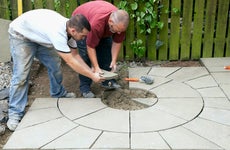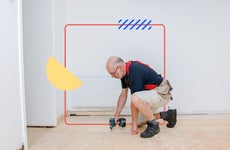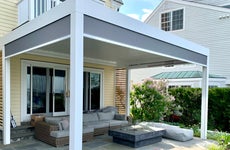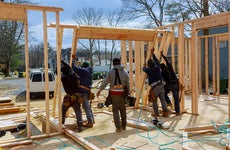What does it cost to build a fire pit?
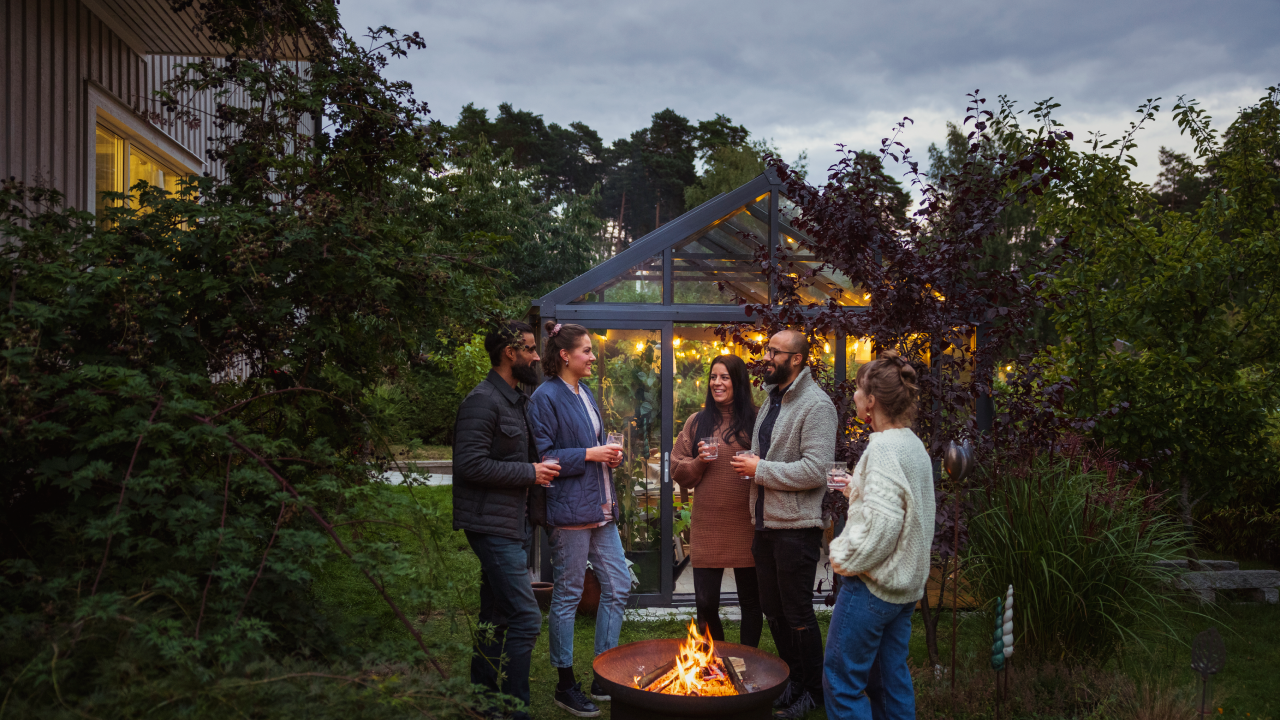
The Bankrate promise
At Bankrate we strive to help you make smarter financial decisions. While we adhere to strict , this post may contain references to products from our partners. Here's an explanation for .
Key takeaways
- The average fire pit costs between $200 and $3,000 to build, though some varieties run as high as $5,000.
- The fire pit’s size, fuel source and materials used all affect its cost, as does whether it’s built in-ground or above-ground.
- DIY-ing a fire pit installation can save half the cost, though pros may be needed to connect gas- or electric-powered pits.
They constantly rank among the top requested design features on American Society of Landscape Architecture surveys. Among outdoor decor renovations, “fire features” (fire pits and fireplaces) were among the top: Purchases of them rose 18 percent in 2022, according to the “2023 Houzz & Home Study.”
Affordability may be part of the fire pit’s appeal. The average cost of building a fire pit is around $850, within a range between $200 and $3,000. Of course, there are multiple factors influencing costs such as materials used, the size of the fire pit, and any add-ons.
Let’s gaze into the fire pit, examining the costs, the kinds available, and whether you should do it yourself or rely on pros for the job.
Types of fire pits
Shopping for fire pits opens a world with tons of possibilities. Here’s a breakdown of some of the more popular types and some considerations for each.
Off-the-shelf fire pits
Some fire pits come ready to use straight out of the box. Basically, they’re big bowls: Ones made of wood start from only $30, while propane ones cost around $100. It allows you to create a cozy spot in your backyard for much less than going the custom route.
There are some drawbacks to this variety. If your bowl contains a steel finish that becomes damaged or starts rusting, you’ll need to replace the thing. And, it requires more maintenance in that you need to remove the ash after every use.
Prefab fire pits
Prefab kits come with everything you need to assemble. They blend right in, especially if your backyard contains stone or paver elements. They’re not too expensive, with the average costs ranging from $500 to $600. It’s also easy to clean them, and you can treat them to prevent fading of the UV protective coating.
Setting them up is also relatively easy. However, the quality of materials tends to be lower than you would find with custom-made fire pits, making prefab models more susceptible to damage and increasing the likelihood of replacing them more often.
Custom-built fire pits
Custom-made fire pits create a permanent fixture for your patio. Of course, they’re pricier than ready-made models, costing as much as $3,000 to $5,000: You’re paying for higher quality of materials and perhaps labor from professionals. When selecting a custom-made model, you can choose between in-ground and above-ground.
In-ground vs above-ground fire pits
In-ground fire pits are as their names implies: built at ground level. You’ll dig to set the base, so the fire is actually below the surface. Above-ground fire pits reside above the ground level. These feature flames more prominently, since you’re building the structure from the ground up.
In-ground fire pits are more expensive (between $1,000 and $3,000 to install), but they carry several safety advantages. Because your fire is lower, you’re less likely for renegade flames to ignite surrounding foliage or furniture. However, if you go this route, leave some small gaps at the base layer for ventilation, or your fire will not have the oxygen needed.
Meanwhile, above-ground fire pits (averaging between $200 and $1,500 to install) are more dramatic, offering the warmth and appearance of an outdoor hearth. You also have more choices on the functionality side. You can have one installed by a professional or use a portable one. With portable options, you can tuck them away when you’re not using them or take them on a camping trip.
What factors influence fire pit costs?
Fire pit materials
The materials your fire pit is built with influence its costs significantly. Concrete is the least expensive at $110 while Techo-Bloc Valencia, a type of stone slab, being the most expensive at $610.
| Materials | Per project costs |
|---|---|
| Source: HomeAdvisor | |
| Concrete block | $110 |
| Fire brick/brick paver | $280 |
| Field stone | $300 |
| Nicolock/Unilock stones | $500 |
| Techo-Bloc Valencia | $610 |
Fire pit size
Your fire pit’s size also impacts costs. The smallest fire pits are from 36 inches in diameter and cost between $200 to $900. The largest models have a diameter of 48 inches, and run from $250 to $2,000.
| Size (in diameters) | Cost range |
|---|---|
| Source: HomeAdvisor | |
| 36 inches | $200-$900 |
| 40 inches | $165-$1,300 |
| 44 inches | $200-$1,600 |
| 48 inches | $250-$2,000 |
Fire pit fuel
You’ll also want to account for fuel costs. Firewood, propane, and charcoal are the cheapest sources, averaging $300. Natural gas is more expensive, ranging from $400 to $3,000, while electric ranges from $350 to $1,500.
Fire pit accessories
Don’t forget the extras! There are accessories you can add to your fire pit — some for safety, others for aesthetics.
| Accessory | Cost |
|---|---|
| Source: Fixr.com | |
| Safety screens | $40 to $300 |
| Fire grates | $50 to $280 |
| Lava rock | $20-$50 |
| Fire pit ring | $50-$250 |
| Built-in seating | $1,500-$3,000 |
Fire pit vs outdoor fireplace
Fire pits are often conflated with outdoor fireplaces, but the two have substantial differences.
A fire pit gives you a 360-degree heating source where you can sit around it in a circle to enjoy its warmth and watch the flames. Conversely, an outdoor fireplace is more limited in seating space, and supplies heat in a more linear fashion.
That heat tends to be more intense, however. As a result, fireplaces can be used for cooking: Outdoor models often include grills or ovens.
Another difference is fire pits can emit smoke in all directions, since they are open. In contrast, outdoor fireplaces are characterized by a chimney, which forces the smoke upward into the sky. It’s the presence of the chimney, along with other surrounding masonry elements, that make fireplaces more expensive than fire pits. Compared to the latter’s average $300-$1,400 range, outdoor fireplace costs run from $1,000 to $4,000 — and that’s for the prefab variety. Go the custom route, and the cost can mount as high as $15,000.
50%
Source: HomeAdvisor
DIY building a fire pit
You can build a fire pit on your own — and you might well want to, given that half the installation cost of one goes to labor. With some simple designs, you can do the job in one afternoon. You’ll need materials like fire bricks, a shovel, pea gravel, sand, a metal fire pit ring, retaining wall bricks, and a level.
The work is laborious in that you’re transporting concrete pavers, digging a hole, and bending over often. However, if you don’t mind the physical activity, it’s a simple project to do as it mainly involves digging a seven-inch hole, lining bricks, and adding sand and gravel.
For more intricate fire pit projects, you might want to hire a contractor with experience in installing fire pits — often, landscape companies specialize in this feature. Labor costs vary based on the fire pit size and the time it takes to finish the job — and the sort of laborers involved.
A fire pit can be a good DIY project if it’ll be using charcoal or firewood. But professional installation can be crucial if your fire pit will be fired by electricity: You’ll want a licensed electrician to do the job.
And when it comes to using propane or natural gas models, “always have a professionally licensed contractor hook this up for you since the gas needs to run at an acceptable rate of flow,” suggests Surinder Multani, owner of California-based BBQ Outlets, which sells, designs and installs outdoor cooking equipment. “If there is too much or too little pressurization, this can be incredibly hazardous, which is why it is best to always hire someone with the proper credentials who can examine the gas lines before installing.”
Do fire pits add home value?
In terms of return on investment (ROI), fire features like fire pits recoup roughly half their costs — 56 percent, to be precise, according to the National Association of Home Realtors/National Association of Landscape Professionals’ “2023 Remodeling Impact Report: Outdoor Features.”
Parsing whether a fire pit in particular enhances your home’s worth can be difficult. Upgrading landscaping in general (which includes adding architectural features to the environs) can increase a home’s resale value by 15-20 percent on average. And usually, anything that extends or enhances the living spaces, which a fire pit arguably does, bumps up the asking price too.
Of course, a fire pit may not be to every buyer’s taste. But given that it’s not that difficult to dismantle or maintain (unlike, say, a swimming pool), it probably wouldn’t be a big detriment either. And if you live in a neighborhood or region where outdoor entertaining and fixture-laden backyards are the norm, you’d certainly want to keep up with the comps.
Yes, it can increase your home’s value, as it adds functionality to your outdoor living space. According to Angi’s “The State of Home Spending 2022 Report” it states 34% of projects completed is to enhance homebuyers’ lifestyle needs. That means if you find a prospective buyer who wants to enjoy the outdoors from the comforts of home, a well-designed fire pit will be a huge draw. On average, you can expect to receive a cost recovery of 56 percent on fire features.
The bottom line on building a fire pit
Placement of your fire pit is among the most important considerations. You should keep an open flame at least 10 feet away from any shrubs, tree branches, the house and your property line.
“Set up your fire pit so that the kids can run around while the adults relax around the fire and keep an eye on them,” advises John Riedl, Founder of EasyCash Offer Florida, a real estate firm.
You’ll also want to adopt best practices when using your pit. It must be large enough to allow you to have coals igniting beside it (if applicable) so that you may regulate the temperature under the pit as needed. If you’re opting for wood-burning, “make sure that the logs are the right size for your fire pit,” says Riedl. You want to make sure they don’t hang over the side, which might cause a safety issue with errant sparks or flames.
Related Articles
